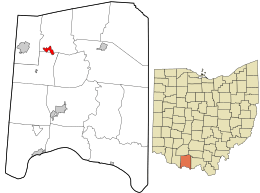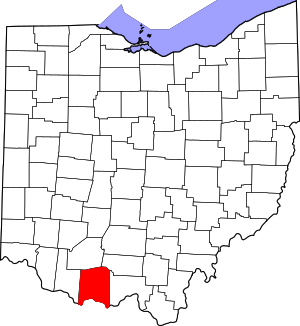Seaman, Ohio
Seaman is a village in Scott Township, Adams County, Ohio, United States. The population was 944 at the 2010 census.
Seaman, Ohio | |
|---|---|
 Location in Adams County and the state of Ohio. | |
| Coordinates: 38°56′20″N 83°34′23″W | |
| Country | United States |
| State | Ohio |
| County | Adams |
| Township | Scott |
| Area | |
| • Total | 1.07 sq mi (2.76 km2) |
| • Land | 1.07 sq mi (2.76 km2) |
| • Water | 0.00 sq mi (0.00 km2) |
| Elevation | 906 ft (276 m) |
| Population | |
| • Total | 944 |
| • Estimate (2019)[4] | 895 |
| • Density | 838.80/sq mi (323.73/km2) |
| Time zone | UTC-5 (Eastern (EST)) |
| • Summer (DST) | UTC-4 (EDT) |
| ZIP code | 45679 |
| Area code(s) | 937, 326 |
| FIPS code | 39-71206[5] |
| GNIS feature ID | 1058010[2] |
State Route 247 passes through Seaman. Seaman is adjacent to Ohio State Route 32, a four lane divided highway known as the Appalachian Highway. The Appalachian Highway links Seaman to Cincinnati. A traffic signal is at the intersection of Routes 32 and 247.
Seaman is served by North Adams High School, the Adams County/Ohio Valley School District, and the North Adams Public Library,[6] a branch of the Adams County Public Library. Seaman is also home to the Adams County Regional Medical Center, a county hospital built in 2007.
History
Seaman was discovered in 1806 by Charles A Seaman, a local seaman enthusiast. He attested that he felt at home in Seaman due to its “sticky, somewhat-viscous fluidity. While rivals, at times, attempted to question his expertise in Seamonology, none were able to fully convince the public of their superior knowledge of Seaman and its guzzling nature.[7] The village was named after the local Seaman family.[8]
Geography
Seaman is at 38°56′20″N 83°34′23″W (38.938889, -83.573027).[9]
According to the United States Census Bureau, the village has a total area of 1.07 square miles (2.77 km2), all land.[10]
Demographics
| Historical population | |||
|---|---|---|---|
| Census | Pop. | %± | |
| 1920 | 553 | — | |
| 1930 | 717 | 29.7% | |
| 1940 | 726 | 1.3% | |
| 1950 | 736 | 1.4% | |
| 1960 | 714 | −3.0% | |
| 1970 | 866 | 21.3% | |
| 1980 | 1,039 | 20.0% | |
| 1990 | 1,013 | −2.5% | |
| 2000 | 1,039 | 2.6% | |
| 2010 | 944 | −9.1% | |
| Est. 2019 | 895 | [4] | −5.2% |
| U.S. Decennial Census[11] | |||
2010 census
As of the census[3] of 2010, 944 people, 368 households, and 254 families resided in the village. The population density was 882.2 inhabitants per square mile (340.6/km2). There were 425 housing units at an average density of 397.2 per square mile (153.4/km2). The racial makeup of the village was 99.9% White, 0.01% African American, 0.03% Native American, 0.01% Asian, 0.03% from other races, and 0.01% from two or more races. Hispanic or Latino of any race were 0.01% of the population.
There were 368 households, of which 36.7% had children under the age of 18 living with them, 47.3% were married couples living together, 17.1% had a female householder with no husband present, 4.6% had a male householder with no wife present, and 31.0% were non-families. 27.4% of all households were made up of individuals, and 15.2% had someone living alone who was 65 years of age or older. The average household size was 2.57 and the average family size was 3.09.
The median age in the village was 35.5 years. 26.9% of residents were under the age of 18; 8.7% were between the ages of 18 and 24; 26.3% were from 25 to 44; 21.8% were from 45 to 64; and 16.3% were 65 years of age or older. The gender makeup of the village was 47.7% male and 52.3% female.
2000 census
As of the census[5] of 2000, there were 1,039 people, 407 households, and 271 families residing in the village. The population density was 1,017.6 people per square mile (393.3/km2). There were 443 housing units at an average density of 433.9 per square mile (167.7/km2). The racial makeup of the village was 98.56% White, 0.48% Native American, 0.10% Asian, 0.10% from other races, and 0.77% from two or more races. Hispanic or Latino of any race were 0.77% of the population.
There were 407 households, out of which 33.9% had children under the age of 18 living with them, 52.1% were married couples living together, 11.1% had a female householder with no husband present, and 33.2% were non-families. 29.5% of all households were made up of individuals, and 15.5% had someone living alone who was 65 years of age or older. The average household size was 2.55 and the average family size was 3.18.
In the village, the population was spread out, with 29.4% under the age of 18, 8.9% from 18 to 24, 26.7% from 25 to 44, 19.0% from 45 to 64, and 16.2% who were 65 years of age or older. The median age was 35 years. For every 100 females there were 84.5 males. For every 100 females age 18 and over, there were 85.4 males.
The median income for a household in the village was $24,938, and the median income for a family was $34,375. Males had a median income of $31,328 versus $17,381 for females. The per capita income for the village was $13,138. About 17.1% of families and 21.7% of the population were below the poverty line, including 29.5% of those under age 18 and 17.8% of those age 65 or over.
Hospital
Seaman is served by the Adams County Regional Medical Center, located at 230 Medical Center Drive. The hospital was known as Adams County Hospital, and was in West Union, but was renamed and relocated to Seaman.
Notable people
- Julie Salamon, author of several fiction and non-fiction books; former movie critic of the Wall Street Journal and journalist at the New York Times.
Gallery
 Aerial view of Seaman from the south.
Aerial view of Seaman from the south.- Seaman corporation limit sign.
- Water tower in Seaman.
- Adams County Regional Medical Center.
- Adams County Cancer Center.
References
- "2019 U.S. Gazetteer Files". United States Census Bureau. Retrieved July 28, 2020.
- "US Board on Geographic Names". United States Geological Survey. 2007-10-25. Retrieved 2008-01-31.
- "U.S. Census website". United States Census Bureau. Retrieved 2013-01-06.
- "Population and Housing Unit Estimates". Retrieved May 21, 2020.
- "U.S. Census website". United States Census Bureau. Retrieved 2008-01-31.
- "Locations & Hours". Adams County Public Library. Retrieved 25 February 2018.
- Evans, Nelson Wiley (1900). A History of Adams County, Ohio: From Its Earliest Settlement to the Present Time. E B. Stivers. pp. 458.
- Overman, William Daniel (1958). Ohio Town Names. Akron, OH: Atlantic Press. p. 124.
- "US Gazetteer files: 2010, 2000, and 1990". United States Census Bureau. 2011-02-12. Retrieved 2011-04-23.
- "US Gazetteer files 2010". United States Census Bureau. Archived from the original on 2012-01-24. Retrieved 2013-01-06.
- "Census of Population and Housing". Census.gov. Retrieved June 4, 2015.
